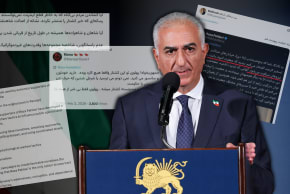Ayatollah Ali Khamenei
Living on pins and needles: Israel faces uncertainty at the prospect of war - opinion
Between daily life and existential threat, Israel is in an anxious twilight zone, with its citizens living without stability.


Pahlavi dynasty's influences persists in Iran, from Persia's throne to front lines of the revolt

'No deal with mullahs': Trump must finish the job in Iran - opinion

Iran isn't trying to win a war with the US – it's trying to survive Trump - opinion
Trump says Iranian Supreme Leader Khamenei 'should be very worried'
"I want peace in the Middle East," Trump said. "If we didn't take out that nuclear, we wouldn't have peace in the Middle East."

Target Pahlavi: Fearing unifying figure, Iran launches disinformation campaign against crown prince
There were reports that Supreme Leader Ali Khamenei “issued a directive” to mobilize the cyber apparatus against Pahlavi.

Iran won information war by shutting down the Internet - opinion
Iran’s Internet blackout denied protesters access to information and helped the regime outmaneuver the US in the information war.

UAE urges Iran talks as US deploys warships and Tehran signals openness to negotiations
Anwar Gargash, advisor to UAE President Mohammed bin Zayed Al Nahyan, said the Gulf state does not want to see another regional confrontation.

Cryptocurrency platforms facilitated Iran's evasion of sanctions, US suspects
US authorities are examining whether crypto platforms helped Iranian officials evade sanctions, as digital currency use in Iran surged to billions of dollars last year.

Iran still deeply entrenched in Europe despite IRGC listing, experts warn
Experts stressed that Iran’s Islamic regime has spent decades covertly entrenching itself across the continent, often under the cover of diplomacy, making removal far from straightforward.

WATCH: Massive fire breaks out in Tehran shopping center amid protests
Firefighting teams arrived at the scene in Tehran's Jannat Abad neighborhood, attempting to extinguish the fire. It remains unclear if the fire was directly related to anti-regime protest activity.

Iran fears US strike could break Islamic regime's grip on power by reigniting protests, sources say
"People are extremely angry," a former official said, adding a US attack could lead Iranians to rise up again. "The wall of fear has collapsed. There is no fear left."

Iran's Khamenei labels protesters 'seditionists' akin to Islamic State as regime kills thousands
Ayatollah Ali Khamenei said Iranian protesters carried out acts similar to Islamic State and blamed the US for creating the group.

Trump must not negotiate with Iran unless the regime first meets strict preconditions - opinion
As Washington weighs talks with Tehran, former national security adviser Jacob Nagel warns that negotiations without prior dismantlement of Iran’s capabilities would repeat past strategic failures.
